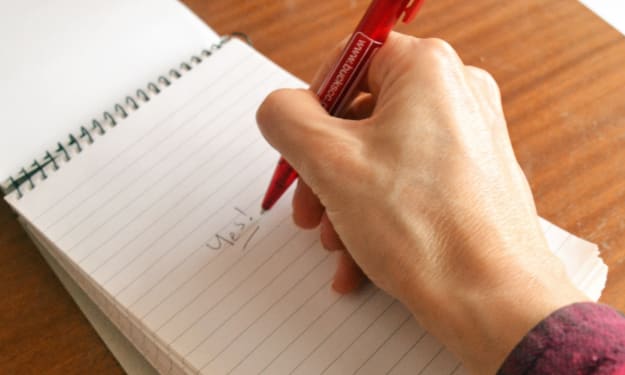People are Being Sued for Using Creative Commons Images
And it’s costing them thousands

Anyone who’s been paying attention to my occasional ranting about photography copyright infringement, might have noticed I’m keen to stay within the law on image licencing and I’m perhaps a little paranoid about it. This is mostly because I had to pay a £1000 fine once in relation to a colleague’s lax approach to picture licencing at work.
While you might think that using a Creative Commons image leaves you in the clear, it’s come to my attention recently that people are being sued for using Creative Commons images — and it’s not always because they’ve made a mistake.
Theft
In some cases, it’s simply because the image was stolen and the person who uploaded it to the Creative Commons website was not the copyright holder and was not authorised to do so. Essentially, it’s theft.
Kelley Keller writing for Small Biz Trends explains this well...
“A big problem with Creative Commons licenses is the fact that anyone can apply them to any work. For example, many of the Creative Commons licensed images on Flickr, Google, and sites that aggregate images weren’t uploaded by the owners of the images. The Creative Commons licenses applied by the people who uploaded the images (but don’t own them) are completely invalid! If you use one of these improperly licensed images, you very well might get caught and find yourself on the losing end of an expensive copyright infringement lawsuit.”
Copyright trolling
Then there’s the issue of copyright trolling where people deliberately upload an image that isn’t covered by the CC licence terms. Or they impose licence conditions that they know are likely to be breached.
Then, when someone uses the unlicensed image, or breaches the terms of use, they issue a legal demand for payment due to copyright infringement.
For example, did you know that the Unsplash CC licence does not include the right to use: images of logos, artwork, or ‘People’s images if they are recognizable in the Photos’? Legal demands have been issued over this.
Here’s an example of that in action: “Photographer faces legal action after using a photo he downloaded from Unsplash”.
Even if you win, you lose
There’s also a fascinating story here of one case that went to court amid accusations of improper attribution and failure to comply with the ShareALike conditions. The defendant who’d downloaded the image won. BUT they spent 14 months tied up in litigation and never recouped their legal costs. The story concludes: “Sometimes a Paid-For License Is Less Expensive Than a Free License.”
Improper attribution can cost thousands!
Here’s another example, quoted by AGT Lawyers, where the person who downloaded the image “did not fully comply with the attribution requirements of the Creative Commons license”. They say fines up to $150,000 for infringement may be levied on guilty parties.
AGT Lawyers say: “I discovered that my friend was an unwitting victim of a copyright holder who preys on people who use his images under Creative Commons licenses but who do not understand or appreciate the details, terms and conditions of the Creative Commons license agreements”.
Failure to credit the photographer is a common mistake, as in this example of a festival that got sued for failure to attribute the photographer. They eventually reached a legal settlement.
These lawsuits are hugely lucrative!
Some photographers are finding law suits for copyright infringement so lucrative that it’s a major source of their income, which beats selling licences to use the photos. Check out this story about a photographer who went into ‘serial copyright litigation’, with about 50 lawsuits.
The court says “the principal way that Philpot appears to make money from his photography is settlement agreements in copyright lawsuits.” Source
In other cases, people have been sued for using an image for financial gain when the licence is either restricted by ShareALike or doesn’t allow commercial use.
I’ll be using my own photos going forward
My photos are all attributed, but there’s no way of telling when a photograph has been stolen and uploaded without permission, so I’ll be replacing what I can with my own photos.
I’ve also used Unsplash images of people and logos in the past… a situation I plan to fix very quickly.
I’ll mostly use my own pictures going forward and request that people contributing to my publication do the same.
Read more on the risks and problems here: https://smallbiztrends.com/2015/03/using-creative-commons.html
Note to the worried...
It is perhaps worth adding that thousands of people have used creative commons images without any problems in the past, and that if you credit them properly, you’d have to be unlucky for any issues to arise. I personally have used them on a handful of book covers for 10 years, with no problems. But as I’m using a lot more images on my blogs and I’m also running a publication now, this issue was of interest and concern to me.
(c) Susie Kearley 2022. All Rights Reserved.
About the Creator
Reader insights
Nice work
Very well written. Keep up the good work!
Top insight
Expert insights and opinions
Arguments were carefully researched and presented






Comments (1)
Hi I am a new contributor and I came across your article. I have been writing for 10 years but just came back to Vocal this week. I have always worried about pictures. When I started it wasn't a big deal but I have had a friend that PAID for the picture and the original photographer stated it was stolen and took her to court and she paid. Good luck with this and using your own pictures. Canva would probably be a good help too. good luck with everything.